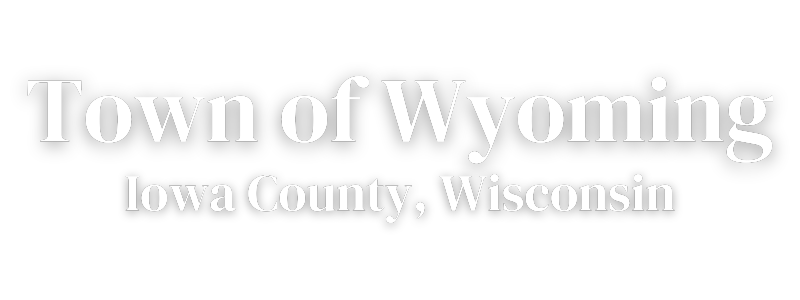ATV/UTV Joyriding on Wyoming Town Roads: A Hazardous Public Nuisance
by Tom Kelly
A small group of ATV and UTV riders has requested the town board to exercise its authority under §23.33 Wisconsin Statutes to allow these vehicles to joyride on town roads. An ordinance is needed because such use is prohibited under state and federal law. Iowa County has a history of granting such use on its roads if a town permits it. Anyone can use the town road now for agricultural purposes. It is important to note that the town cannot limit its roads to residents of the town.
This group has proposed an ordinance which provides, among other things, a universal 35 mph speed limit, even though they are limited to 10 mph near dwellings when traveling on taxpayer-funded off road trails, of which there are hundreds of miles in this state. The ordinance “limits” noise to 96 decibels, a level comparable to cars without mufflers and gas-powered lawnmowers. It also allows rides from 6:00 a.m. until 10:00 p.m. every day and night. Snowmobiles are limited to 78 decibels by state law.
The towns of Arena and Dodgeville have adopted these ordinances, providing easy access to our town and county roads from taverns in those townships if an ordinance is approved. Does anyone believe that property values are enhanced by allowing these vehicles on town roads?
As to drunk driving, state law does not count convictions of drivers of these vehicles, whether on trails or public roads, in suspending drivers licenses. Folks in northern Wisconsin experience loud radios, early morning noise, tavern-to-tavern caravans. A lawyer friend up north says that once someone’s license is suspended or revoked, they simply drive their UTVs to and from bars without fear of prosecution for driving on a revoked license
The proponents presented our board with a copy of the Spring Green ordinance as a model. That ordinance, unlike the proposed Wyoming ordinance, has a provision addressing operator liability insurance. The Spring Green ordinance merely requires such insurance as is required by state law. Interestingly, the proponents have not advised our board that their vehicles are exempt from the mandatory liability insurance that every licensed motor vehicle operator must carry. Some of these UTVs carry up to six passengers and are as large as a small car, and can inflict a great deal of damage and injury in a crash with another car, truck, farm implement, cyclist or pedestrian.
These vehicles are unsafe on paved roads as they have high centers of gravity and use low pressure tires not designed for highway use. They lack turn signals and backup lights. These vehicles meet no government safety standards and are prone to rollover when driven fast. The manufacturers post warnings advising that they should not be driven on hard surfaces, even dirt and gravel roads, yet hypocritically fund groups such as we have here seeking road access, resulting in huge sales.
The proponents have not disclosed the costs of signage or the source of funds and who would be responsible to pay for personal injury in lawsuits alleging inadequate warning signs for sharp curves and hidden driveways. Their typical signage consists merely of ATV speed limits and designation of ATV routes, no warning signs.
The proponents have not mentioned that state law allows 12-year-old kids to drive ATVs if they take an online safety course. This was one of the reasons the Caledonia town board denied an ordinance, pointing out that a 12-year-old can legally drive an ATV, without insurance, on town roads at 55 mph if that is the speed limit as it is on county highways throughout the state. Also 16-year-olds are allowed to operate UTVs without drivers training or licenses.
There has been some discussion about limiting the ordinance to some roads but not others. Such a discussion is premature. The question is whether to exercise the statutor discretion to allow any ATV or UTV use of town roads. The board has plenty of reasons to vote “No.” However, if a majority on the board believes otherwise, a referendum is the only proper way to proceed. If the voters give the board the authority, then they can negotiate the terms of use. All town costs of the referendum should be paid by the proponents. Already the town has incurred clerical and mailing expense on this issue.
More complete legal analysis is provided by the Town of Caledonia decision denying a request to use their roads. The proponents here have complained that this document is somehow invalid because that town later revised its position; however, the loopholes in state laws haven’t been amended to address the public safety issues described therein.
One town board member who was opposed to on-road use stated, “The purpose of town government is really to protect, in my view . . . public health and safety and welfare. In my assessment, this proposal does not pass the smell test.”
A vote to allow ATV/UTV recreational use, without an affirmative referendum result, would arguably subject any board member so voting to moral if not legal responsibility for injuries or deaths from the inevitable crashes.
The proponents to date have failed to present any reasons, other than their wish to joy ride, why the town should let them use our roads to do it. Town boards are for the protection of the common good, not to kowtow to anyone who is unhappy with the status quo. Their remedy is with the state legislature to close the many loopholes in existing law, not with the Town of Wyoming.
